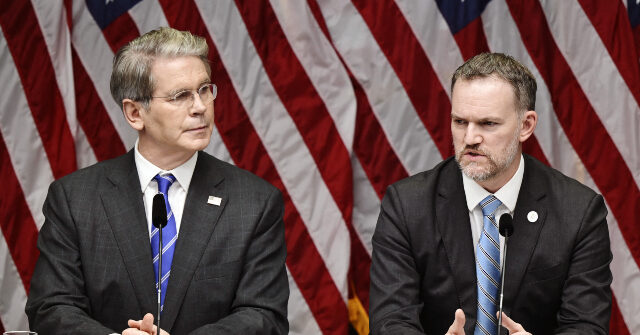Trade officials from the United States and China concluded their third round of talks in Stockholm, Sweden, on Tuesday with a pledge to extend the current “tariff truce” between the two countries – provided President Donald Trump approves.
“We’re going to head back to Washington, D.C. We’re going to talk to the president about whether that’s something that he wants to do. The president can make a final call,” U.S. Trade Representative (USTR) Jamieson Greer said at a press conference in Stockholm.
“We’ll report back to him the process we had here. We had constructive meetings for sure, to go back with the positive report. But the extension of the pause he’ll decide,” Greer said.
Greer said in a social media post on Monday that the Chinese have been “very pragmatic” in their approach to negotiations.
“Obviously we’ve had a lot of tensions over the years. We have tensions now, but the fact that we are regularly meeting with them to address these issues gives us a good footing for these negotiations,” he wrote.
The U.S. and China agreed to suspend most of the tariffs they imposed against each other in May. America’s “reciprocal tariffs,” which soared as high as 125 percent during the spring trade standoff, were reduced to ten percent, plus 20 percent for exports related to the fentanyl drug crisis. China did the same, and also agreed to put non-tariff trade countermeasures on hold.
The tariff truce was touted by both sides as the first step toward a “sustainable, long-term, and mutually beneficial” trade relationship. Such a relationship has yet to materialize, and the suspension of tariffs is due to expire on August 12.
Treasury Secretary Scott Bessent said that if an extension is not negotiated before the August 12 deadline, U.S. tariffs on Chinese goods will “boomerang” back to the triple-digit levels that were established in April.
Bessent added that trade teams from the U.S. and China plan to meet again in 90 days, so whatever has been accomplished in Stockholm during the current round of talks will have to be good enough to persuade Trump to authorize an extension.
Bessent said the past two days of talks were “fulsome” and “constructive.” He was a bit evasive about the remaining obstacles, although he suggested the United States would like China to agree to buy less oil from Iran. Greer and Bessent also reportedly encouraged the Chinese to back away from state controls, and subsidies, for their export-driven economy.
“There was good personal interaction being built up, good mutual respect. I think we understand their agenda much better,” he said.
Bessent disputed comments from China’s trade representative, Li Chenggang, that implied the tariff truce extension was a done deal.
“The Chinese deputy minister did say that we had agreed on a pause. We have not. Nothing is agreed until we speak with President Trump,” Bessent insisted.
Trump told reporters aboard Air Force One he would receive a full account of the talks on Wednesday.
“I just had a phone call from Scott Bessent. They had a very good meeting with China, and it seems that they’re going to brief me tomorrow. We’ll either approve it or not. But he felt very good about the meeting, better than he felt — that he felt yesterday,” Trump said.
Read the full article here
